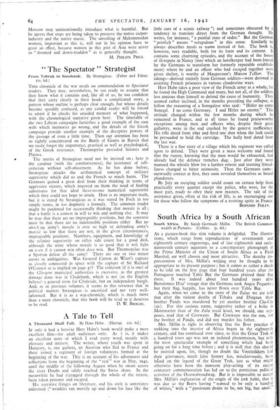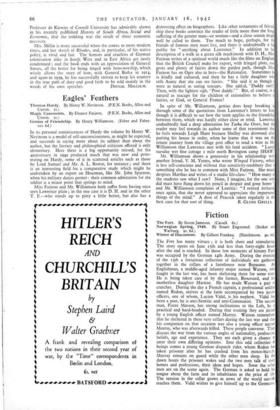South Africa by a South African
As a picture-book this slim volume is delightful. The illustra- tions, which range from reproductions of seventeenth and eighteenth century engravings, and of late eighteenth and early- nineteenth century aquatints to a contemporary photograph of the Prime Minister of the Union of South Africa as a Field Marshal, are well chosen and most attractive. The sketchy im- pressionism of Mrs. Millin's writing may be thought to be appropriate to its present purpose ; but it comes as rather a shock to be told on the first page that four hundred years after the Portuguese touched Table Bay the Germans planted their flag there. It was indeed about four hundred years after Bartolomeo Diaz' voyage that the Germans took Angra Pequefia ; but their flag, happily, has never flown over Table Bay. Again, when we come to the story of the Zulus we are told that after the violent deaths of Tchaka and Dingaan their brother Panda was murdered by yet another brother Clu-Clu (sic). For this curious name, suggestive rather of a boite in Montmartre than of the Zulu royal kraal, we should, one sup- poses, read that of Cetewayo. But Cetewayo was the son, not the brother of Panda, and did not murder his father.
Mrs. Millin is right in observing that the Boer practice of trekking into the interior of Africa began in the eighteenth century, and has continued ever since, so that the Great Trek of a hundred years ago was not an isolated phenomenon, but only the most spectacular example of something which had bc:11 going on for a long time before ; and it is well that this shotid be insisted upon, for, though no doubt the Voortrekkers h their grievances, much false history has, mischievously, be:11 bised on the legend of the Great, Trek, just as what might otherwise have been the innocent play-acting of its recent centenary commemoration has led on to the pernicious political activities of the Ossewabrandwag. But it is impossible to accept Mrs. Millin's explanation of the origin of the trek habit, that it was due to the Boers having "wanted to be only a handful of whites," with a "passionate desire to be, not big, but small? Professor de Kiewiet of Cornell University has admirably shown in his recently putilined History of South Africa, Social and Economic, that the trekking was the result of sheer economic necessity.
Mrs. Millin is more successful when she comes to more modern times, and her sketch of Rhodes, and, in particular, of his native policy, is vivid and fair. The horrors and cruelties of German colonisation alike in South West and in East Africa are justly condemned ; and the book ends with an appreciation of General Smuts, all the better for being tinged with hero-worship, which wisely allows the story of how, with General Botha in 1914, and again in 1939, he has successfully striven to keep his country in the true path of duty and good faith to be told mainly in the



























 Previous page
Previous page